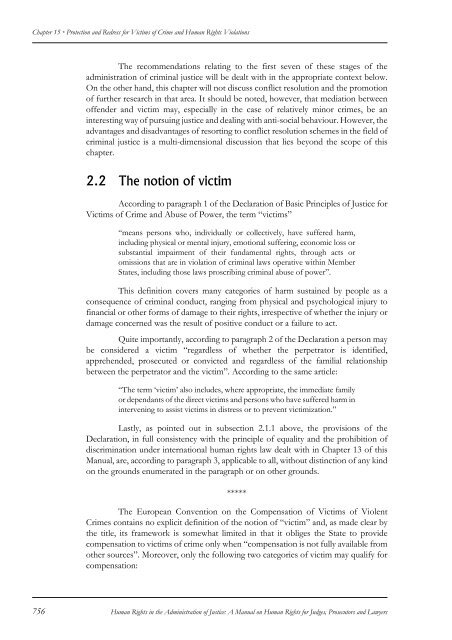protection and redress for victims of crime and human rights violations
protection and redress for victims of crime and human rights violations
protection and redress for victims of crime and human rights violations
You also want an ePaper? Increase the reach of your titles
YUMPU automatically turns print PDFs into web optimized ePapers that Google loves.
Chapter 15 • Protection <strong>and</strong> Redress <strong>for</strong> Victims <strong>of</strong> Crime <strong>and</strong> Human Rights ViolationsThe recommendations relating to the first seven <strong>of</strong> these stages <strong>of</strong> theadministration <strong>of</strong> criminal justice will be dealt with in the appropriate context below.On the other h<strong>and</strong>, this chapter will not discuss conflict resolution <strong>and</strong> the promotion<strong>of</strong> further research in that area. It should be noted, however, that mediation between<strong>of</strong>fender <strong>and</strong> victim may, especially in the case <strong>of</strong> relatively minor <strong>crime</strong>s, be aninteresting way <strong>of</strong> pursuing justice <strong>and</strong> dealing with anti-social behaviour. However, theadvantages <strong>and</strong> disadvantages <strong>of</strong> resorting to conflict resolution schemes in the field <strong>of</strong>criminal justice is a multi-dimensional discussion that lies beyond the scope <strong>of</strong> thischapter.2.2 The notion <strong>of</strong> victimAccording to paragraph 1 <strong>of</strong> the Declaration <strong>of</strong> Basic Principles <strong>of</strong> Justice <strong>for</strong>Victims <strong>of</strong> Crime <strong>and</strong> Abuse <strong>of</strong> Power, the term “<strong>victims</strong>”“means persons who, individually or collectively, have suffered harm,including physical or mental injury, emotional suffering, economic loss orsubstantial impairment <strong>of</strong> their fundamental <strong>rights</strong>, through acts oromissions that are in violation <strong>of</strong> criminal laws operative within MemberStates, including those laws proscribing criminal abuse <strong>of</strong> power”.This definition covers many categories <strong>of</strong> harm sustained by people as aconsequence <strong>of</strong> criminal conduct, ranging from physical <strong>and</strong> psychological injury t<strong>of</strong>inancial or other <strong>for</strong>ms <strong>of</strong> damage to their <strong>rights</strong>, irrespective <strong>of</strong> whether the injury ordamage concerned was the result <strong>of</strong> positive conduct or a failure to act.Quite importantly, according to paragraph 2 <strong>of</strong> the Declaration a person maybe considered a victim “regardless <strong>of</strong> whether the perpetrator is identified,apprehended, prosecuted or convicted <strong>and</strong> regardless <strong>of</strong> the familial relationshipbetween the perpetrator <strong>and</strong> the victim”. According to the same article:“The term ‘victim’ also includes, where appropriate, the immediate familyor dependants <strong>of</strong> the direct <strong>victims</strong> <strong>and</strong> persons who have suffered harm inintervening to assist <strong>victims</strong> in distress or to prevent victimization.”Lastly, as pointed out in subsection 2.1.1 above, the provisions <strong>of</strong> theDeclaration, in full consistency with the principle <strong>of</strong> equality <strong>and</strong> the prohibition <strong>of</strong>discrimination under international <strong>human</strong> <strong>rights</strong> law dealt with in Chapter 13 <strong>of</strong> thisManual, are, according to paragraph 3, applicable to all, without distinction <strong>of</strong> any kindon the grounds enumerated in the paragraph or on other grounds.*****The European Convention on the Compensation <strong>of</strong> Victims <strong>of</strong> ViolentCrimes contains no explicit definition <strong>of</strong> the notion <strong>of</strong> “victim” <strong>and</strong>, as made clear bythe title, its framework is somewhat limited in that it obliges the State to providecompensation to <strong>victims</strong> <strong>of</strong> <strong>crime</strong> only when “compensation is not fully available fromother sources”. Moreover, only the following two categories <strong>of</strong> victim may qualify <strong>for</strong>compensation:756 Human Rights in the Administration <strong>of</strong> Justice: A Manual on Human Rights <strong>for</strong> Judges, Prosecutors <strong>and</strong> Lawyers
















